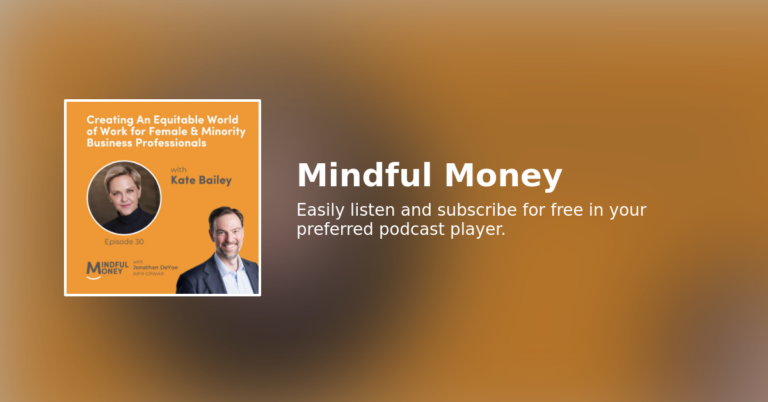Kate Bailey is a seasoned entrepreneur and business consultant with over twenty years of in the trenches experience. She’s built two successful businesses by leading nimble, innovative teams and building strong community connections. She’s the founder of TARRA, a flex office and workspace campus with a mission to create a more inclusive and diverse business community through access to vetted business resources, education, and a powerful network of professional women.
Today Jonathan and Kate discuss key money lessons from Kate’s youth, biases and obstacles that female Founders and Executives face on a daily basis, and Kate’s vision for the future of TARRA.
📺 Watch on YouTube
Key Takeaways
01:04 – Jonathan introduces today’s guest, Kate Bailey, who joins the show to share her entrepreneurial journey and integral business lessons she learned on cash flow, debt and budgeting
09:34 – A key lesson of Kate’s financial life
11:56 – The origin story of TARRA and resources that TARRA offers
17:53 – ‘Grumpy growth’ explained
19:43 – Why Kate is primarily focused on serving women and minority business professionals
23:29 – Biases and roadblocks that female founders and C-Suite executives experience
26:03 – Kate’s mission and vision for TARRA
31:05 – One piece of advice entrepreneurs should pursue and one thing to absolutely avoid
35:30 – The last thing Kate changed her mind about and one thing that he would like people to know about her
37:09 – Jonathan thanks Kate for joining the show and let’s listeners know where to connect with her
Tweetable Quotes
“I joke that I was a bit of an accidental entrepreneur that was always waitin/g to happen because I had a very entrepreneurial spirit as a kid. My whole life, I like to joke, I was a terrible employee because I was always coming into companies and seeing everything that was wrong and wanting to fix them, but I was typically a very junior employee. And I would get very frustrated and I would leave and go do something else.” (03:07)
“Every single dollar that you’re pulling in goes into that bank account, and then every single dollar that you’re spending goes out. And I think that that was the inflection moment of understanding the real world implications of credit, debt, cashflow, etc. And I always say, ‘If it’s not painful, you’re not gonna learn it.’ You can learn the theory and the general concepts behind it. But unless you are actually living that experience, you’re not gonna feel it way down here.” (06:09)
“One of the things that I constantly refer back to is how mad I am that they don’t teach these skills in school – that they don’t teach basic financial accounting, budgeting, cash flow – in high school or college.” (08:21)
“It was the same thing I was experiencing, this sense of isolation, a lack of high quality vetted resources. It was this constant conversation of, ‘where do I find people to hire? I don’t understand accounting.’ And there was a real desire for a collaborative workspace that didn’t feel like an office space. It was this idea of, ‘I don’t really like working from home, but I don’t want to work at a sterile office building either because that’s not really me.’ So, we would convene in coffee shops and hotel lobbies and spaces that felt a little bit more comfortable and accessible. And that’s how TARRA started.” (13:41)
“In between startup and success there is nothing that I found personally that spoke to me – as a professional, as a business owner, as a woman – where I felt like I was getting high quality, affordable, accessible resources. I ended up going to business school because I couldn’t find it. And the reason I decided to go to school was to learn it for myself, but also to find a way to say, ‘how can we break this down into the right kind of content to help these business owners along their journey?’” (18:30)
“There is something that is unbelievably magical about gathering women in a room together to have conversations, to problem solve. Unfortunately, and I wish I didn’t have to say this, we are still dealing with Imposter Syndrome with fear of being wrong or asking the wrong questions. I mean I hear it time and again…and our goal here is just to provide that space where you can ask hard questions.” (22:12)
“I would like the media to pay a little bit more attention to just good, healthy, small businesses because it’s something that will never – to me, at least – go away.” (30:52)
Guest Resources
Mindful Money Resources
For all the free stuff at Mindful Money: https://mindful.money/resources
To buy Jonathan’s first book – Mindful Money: https://www.amazon.com/Mindful-Money-Practices-Financial-Increasing/dp/1608684369
To buy Jonathan’s second book – Mindful Investing: https://www.amazon.com/Mindful-Investing-Outcome-Greater-Well-Being/dp/1608688763
Subscribe to Jonathan’s Weekly Newsletter: https://courses.mindful.money/email-opt-in
Capture the most important benefit of an advisor – behavioral support – without the 1% fee: https://courses.mindful.money/membership
For more complex, one on one financial planning and investing support with Jonathan or a member of Jonathan’s team: https://www.epwealth.com/our-team/berkeley/jonathan-deyoe/
Website: https://mindful.money
Jonathan on LinkedIn: https://www.linkedin.com/in/jonathandeyoe
🎙️
Podcast Production & Marketing by FullCast
This podcast uses the following third-party services for analysis:
Chartable – https://chartable.com/privacy
